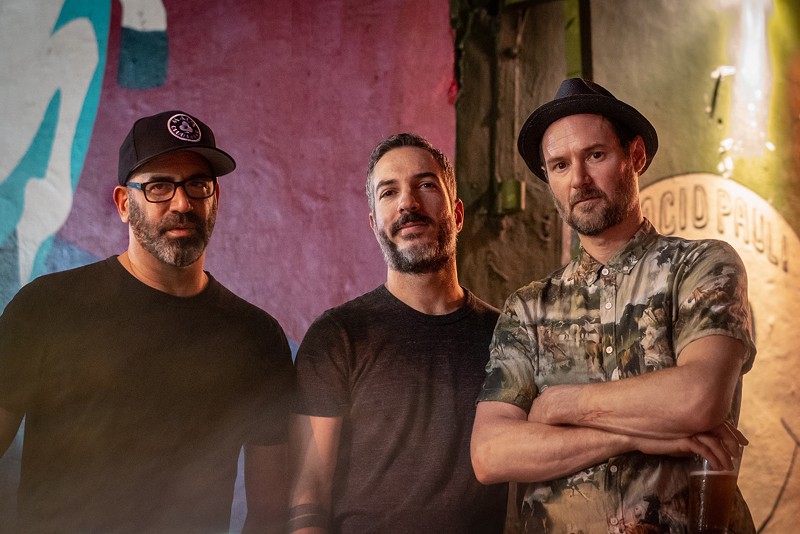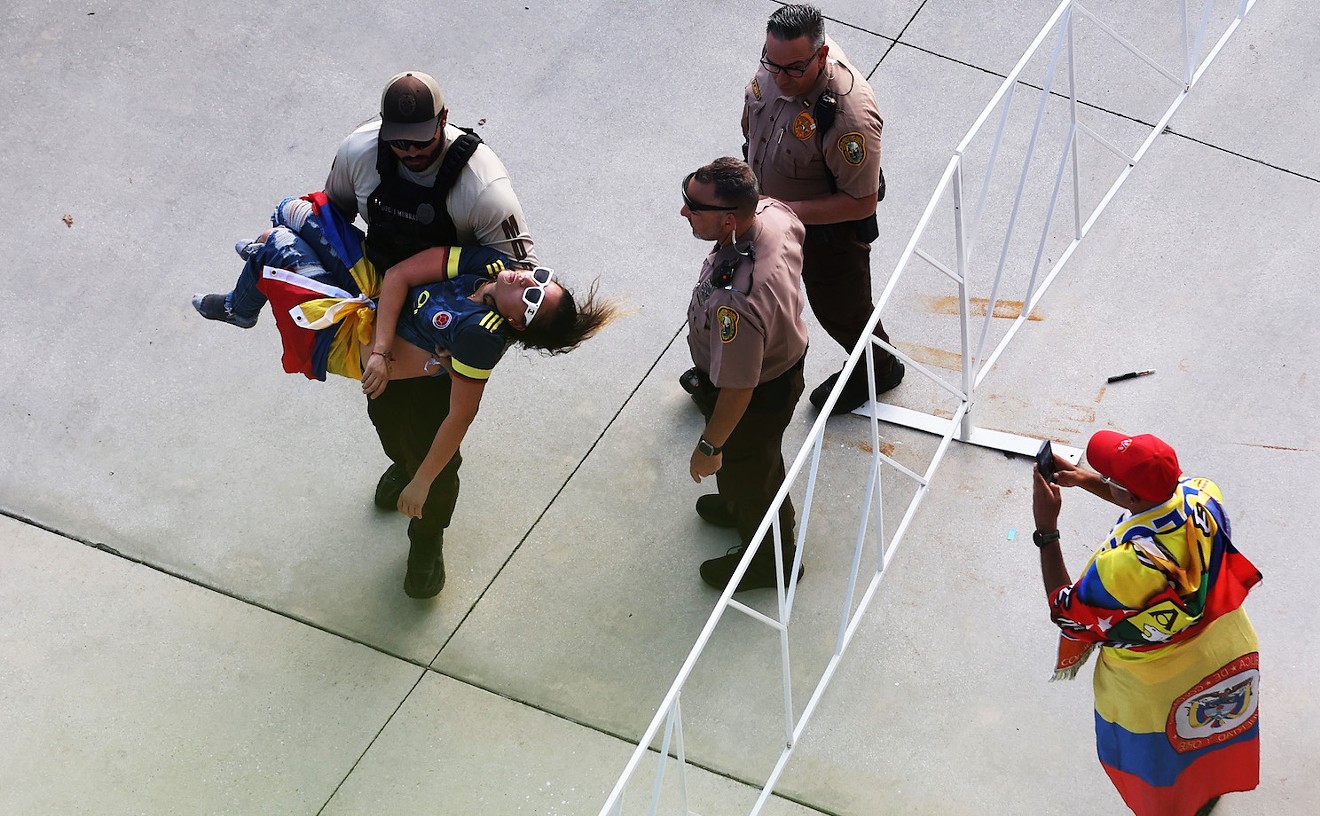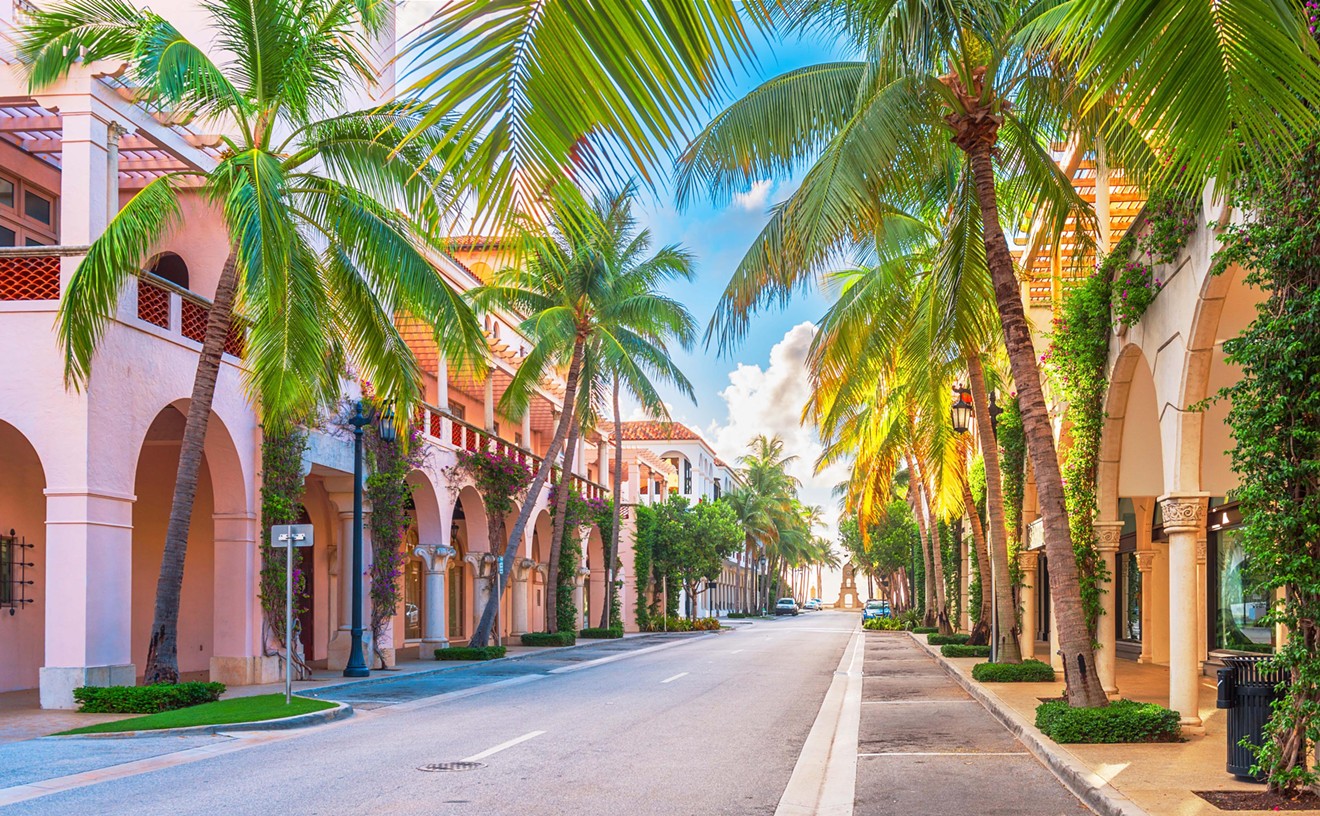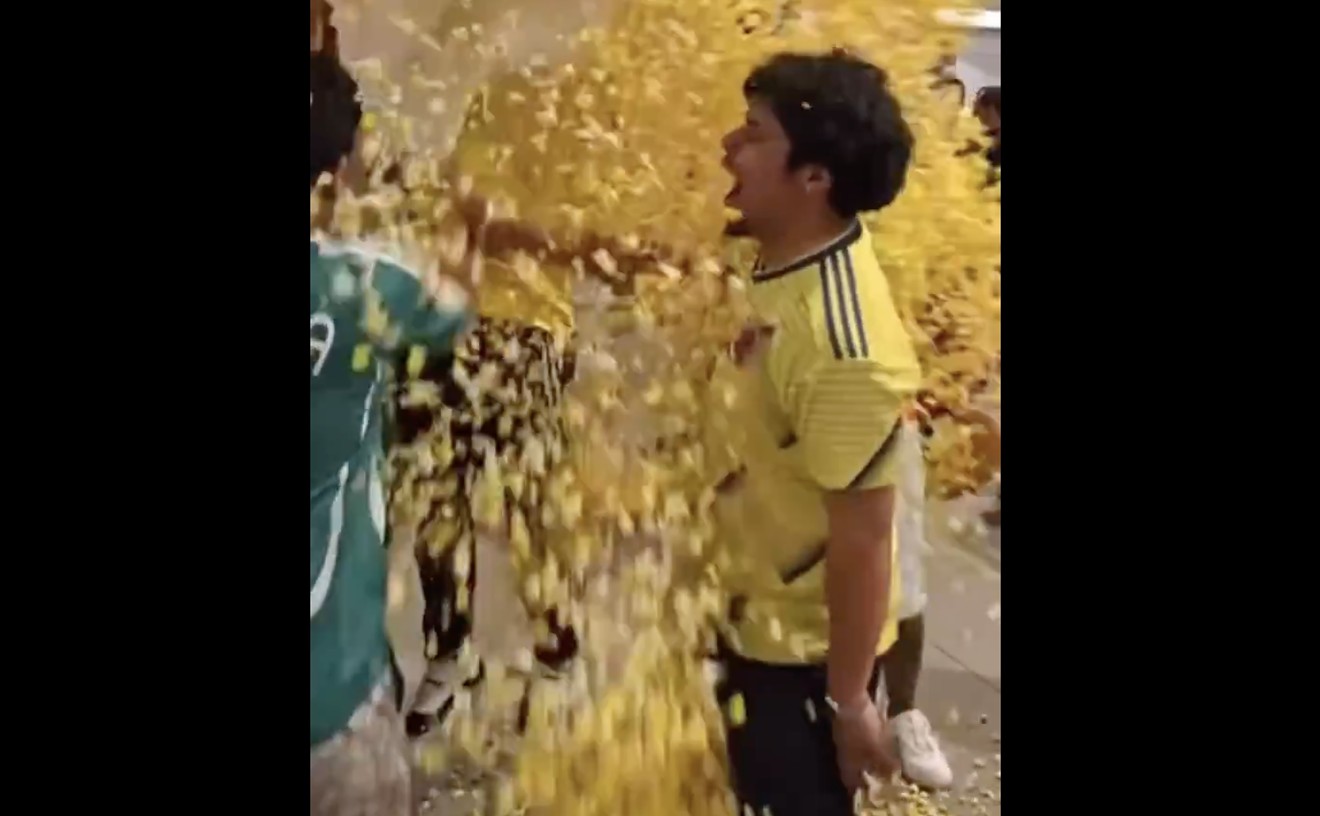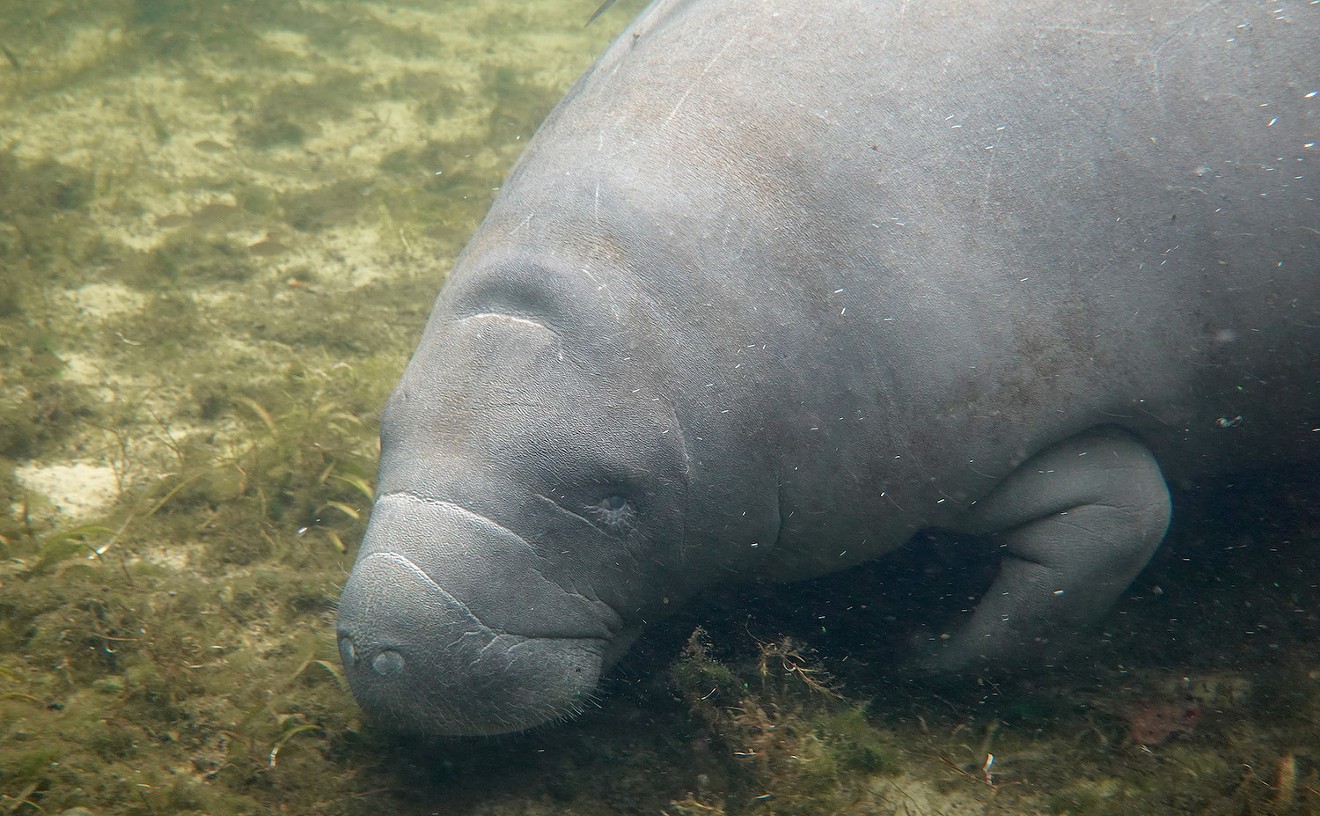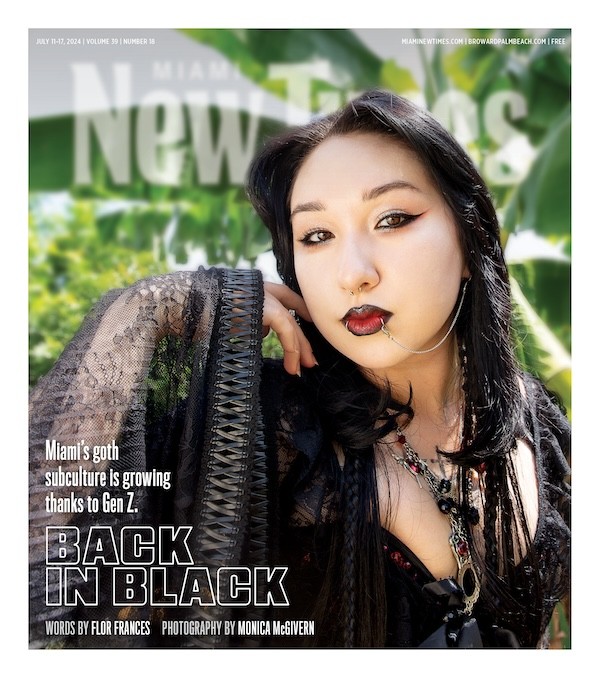It's a Friday night in January 2011, and a cold front has swept through the city, plunging temperatures to a crisp 51 degrees. On North Miami Avenue, near the corner of 29th Street in Wynwood, a red and green neon sign entices passersby with the promise of "Bar Open Liquor." The arrow on the sign points down to an unassuming door where a young woman collects the cover charge and a bouncer keeps watch.
At this point, the Electric Pickle has barely been open for two years — but the small nightclub is already proving it can punch well above its weight. Tonight the club has booked Little Dragon, an up-and-coming Swedish electropop quartet about to release its third album, Ritual Union. The band's North American tour has taken it to some of the nation's premier live music venues, including Crowbar in Tampa and Brooklyn's Music Hall of Williamsburg. But this night in Wynwood, the stage is no more than a makeshift half-pipe set up in the Electric Pickle's parking lot. When the band members ask for the green room, the club's co-owner Will Renuart says they can hang out on the roof.
At five past midnight, the band takes the stage. Lead singer Yukumi Nagano tells the crowd it's been a "lo-o-ong time" since the band has performed outside. It's unclear if the comment is a reference to the band's midwinter tour dates or a subtle complaint that Little Dragon has moved on from performing at DIY spaces.
The show is the band's South Florida debut, and the members seem a little befuddled that the Electric Pickle is the place where this occasion is happening. The music — a set that switches from rock to psychedelia to pop — bounces off the nearby buildings, including a low-rise apartment directly behind the Pickle's parking lot. It's 1:12 a.m. when Nagano, preparing for a three-song encore, asks if the crowd is ready for more. But after the first encore song, "Constant Surprises," the band announces the show is over.
The impromptu end of Little Dragon's debut that night was blamed on a noise curfew — even New Times reported as much in a review of the show — but eight years later, the club's co-owner Tomas Ceddia admits that wasn't true. Ceddia says when Little Dragon began to play its encore, the fire marshal showed up and shut the place down.
"We probably had 1,000 people in the parking lot and the entire club full," Ceddia says. "We got fined for being 14 times over our legal capacity."

Nights like that one, Ceddia laments, would be impossible at the Pickle now. That's because in the ten years since the club opened, the area has exploded with massive development, bringing in restaurants lit with Edison bulbs, residential towers touting "live/work" lifestyles, and Instagram-worthy ice-cream parlors that make the neighborhood feel more like a family-friendly tourist destination than a nightclub district.
"When we opened, we were really the only game in town in Wynwood," Renuart says. "There weren't even any other businesses really, except for a thrift shop."
The same wave of gentrification is also forcing the Pickle's closure: The celebrated dance music venue announced last summer it will close for good this June when its ten-year lease is up. According to Renuart, even if the club could score a new lease, any kind of rent increase would make running the Pickle financially unfeasible.
That the Electric Pickle survived for ten years is nothing short of a miracle.
tweet this
The closure of Wynwood's longest-running nightclub marks the end of an era for the neighborhood's nightlife scene. During its decade-long existence, the Pickle has been recognized globally by publications such as DJ Mag and Rolling Stone, both of which ranked it among the world's best dance clubs. DJs and artists have clamored to perform there, and on several occasions, it has facilitated Miami's introduction to acts including Blood Orange, Seth Troxler, and Maceo Plex, who would go on to become some of music's biggest DJs and indie acts. Along the way, however, the club faced many obstacles, including repeated visits by code enforcement, a dispute over its 5 a.m. liquor license, and an influx of neighbors who saw the club as more of a nuisance than the cultural icon it had quickly become.
Despite its imminent closure, the fact that the Electric Pickle survived for ten years is nothing short of a miracle. While hundreds of music venues and dance clubs have opened and closed in the face of waning popularity and shifting trends, Renuart and Ceddia have done what's nearly impossible in Miami's boom-and-bust nightlife biz: They've kept the Electric Pickle relevant all this time. But with its doors about to close for good, the club's owners say quirky, homegrown establishments like the Pickle are becoming an endangered species thanks to the city's increasing unaffordability and overdevelopment.
"You couldn't get me to move out of [Wynwood] any faster," Renuart says. "Tourists are being dropped off by the busload. We are kind of out of our element now. They are squeezing every cool and independent business out."

It's a warm spring day, and Will Renuart is drinking Veuve Clicquot by the pool at his mother's Coral Gables home not far from the University of Miami campus. He's living in the pool house while he gets ready to close the Pickle. His wife of one and half years, Sino, sits nearby, quietly looking at her phone, occasionally glancing up to crack a smile at the ramblings of her husband.
Renuart's childhood home played an important role in the Electric Pickle's existence. In 2008, after another club vacated the Wynwood building, Renuart — then a 35-year-old professional party boy and budding DJ — jumped at the opportunity to open his own. But without any collateral, no bank was willing to sign a loan. To afford the lease, Renuart asked his mother, Melinda, to take out a loan on her home.
"I needed a couple hundred thousand dollars," Renuart says. "There is a liquor license involved, there is a key fee to get the property, there is a deposit... I pitched the idea to my mom first, and she felt like I had paid my dues and it was time. My family was very supportive."
Before Renuart arrived, the building was a well-known underground venue with the same neon sign, which predates the Pickle. The earliest record of a bar occupying the building, erected in 1940, was in 1953, when it was known as Stone's Bar & Liquor Store. At the turn of the millennium, the venue underwent various incarnations, with names such as the Slak Lounge and Two Last Shoes. In December 2006, it opened as Circa 28 under the ownership of Zeke Alicea, who brought in local promoters such as Sweat Records' Lolo Reskin and Safe's Diego Martinelli. Circa 28's defining feature was the second-level floor, which bent while patrons danced, giving the sensation they might fall through to the ground floor at any moment.
"When we opened, we were really the only game in town in Wynwood."
tweet this
Martinelli says he was brought on by Alicea toward the end of Circa's tenure to breathe new life into the venue. His first order of business was installing a high-quality sound system and asking for the club's stark-white walls to be painted darker. Martinelli also reconfigured the upstairs room into a diamond-shaped layout for which the Pickle would later become known. ("It was a sort of Pickle prototype," Martinelli says.) He also brought other local underground promoters into the fold — Link (AKA Link Miami Rebels), PL0T, and Un_Mute — players who would go on to shape the city's emerging techno scene.
Alicea and Renuart had known each other since before Circa 28's inception, having met while Alicea was working at Groovejet in Miami Beach and Renuart was cutting his teeth and climbing the city's nightlife hierarchy. In 2001, Alicea invited Renuart to join him in hosting a weekly party, Fishy Fridays, at Big Fish, a restaurant on the Miami River.

"We caught fire," Renuart says. "We were doing 20 grand at the bar. [The owner] let me do whatever I wanted, and before you know, we had like 400 people there."
Though Fishy Fridays lasted about a year, Renuart wanted more control over things like bar sales, staffing, and sound, and began considering opening his own venue. In 2006, the perfect opportunity arose when Alicea debuted Circa 28 and invited Renuart to become a promoter. According to Renuart, the business relationship soured just two months after the opening. "He said he wasn't going to do DJs, and, of course, he did DJs," Renuart says. Alicea, who now has a corporate job and lives in Texas, backs up Renuart's assertion: "Our vision just didn't align — that's just really it. We just decided to go our separate ways."
Disappointed, Renuart took it as another learning experience and motivation to find his own place. When Circa 28 went kaput in 2008, Renuart saw it as a serendipitous chance to finally design the kind of club where he would want to party. He reached out to nightlife veteran Tomas Ceddia for help. Ceddia had a decade-plus of nightlife experience hosting Aquabooty, one of Miami's premier house music parties. His deep contact list and business acumen would be the perfect counterbalance to Renuart's creative yet sometimes chaotic personality.
"At first he was cautious," Renuart says, "but he helped come up with the name."
At first, the names being pitched for the new club were posh monikers like "Hush" that seemed more fitting for an upscale South Beach establishment. Then, one night while sitting at home, Ceddia stumbled upon an online video of a science experiment in which an electrical current was being run through a pickled cucumber, setting the vegetable aglow.
When Ceddia pitched the idea to call the club "Electric Pickle," he was shot down. It took a cosign from British producer DJ Harvey, one of the early pioneers who brought U.S. house and garage music to the United Kingdom, to persuade Ceddia's partners. "He was like, 'That's fucking perfect, man!'" Ceddia says. "It was Harvey's blessing that legitimized it for everyone else."

The idea of operating a nightclub versus the reality of it was a lesson Renuart had to learn the hard way. The Pickle opened in March 2009, right before Winter Music Conference, a week when the dance music industry visits Miami to network and party — and a time when many local nightclubs stuff their coffers in order to survive the slower summer months, something that was necessary for the fledgling venue.
With Ceddia's inclination toward soulful house music, Renuart's panache for taking risks, and Martinelli's focus on the emerging underground sounds, the venue was an instant success. Martinelli became an integral role in the operation of the club, acting as a third partner and helping grow the techno scene in Miami while making the Pickle the epicenter.
"The Pickle is one of the best dance clubs I've ever known, pound for pound, from the perspectives of dancing, experiencing music, and DJ'ing," Martinelli says. "Many people across the world also feel this way. The intimacy and size was just right. It had the perfect ratios, the perfect formula."
However, Renuart's inexperience with running a business threatened to undo it all. Ceddia would often castigate Renuart for working on the building without proper permitting. Renuart admits to building the awning over the back patio piecemeal: "I would be welding at night, adding three feet at a time."
"The Pickle is one of the best dance clubs I've ever known, pound for pound."
tweet this
In the club's early days, when Wynwood was mostly desolate after dark, it was easy to get away with breaking the rules, Renuart says. But as the Pickle's popularity grew, other venue owners began to take notice. The fines from the fire marshal after Little Dragon's performance in January 2011 were only the beginning. That September, Miami Fire-Rescue closed the club over Labor Day weekend after an inspection found electrical repairs that needed to be addressed. Then, a year later, in September 2012, the Pickle shut down again, this time for a two-week renovation to install a steel staircase to improve the club's fire safety at the request of the fire marshal.
However, the biggest quagmire came in February 3, 2013, when Miami Police invaded Wynwood and shut down several bars and nightclubs, including the Electric Pickle, in what the cops dubbed "Operation Dry Hour." The crackdown was to enforce the area's supposed 3 a.m. last call. However, all of the establishments that had occupied the building before the Pickle had operated until 5 a.m., and according to Ceddia, the club possessed the necessary liquor license to serve till that time.
"Cops came in and said, 'We are going to take your bartenders to jail.' I said, 'No, they are just doing what I'm telling them to do. Take me to jail instead.'" The cops obliged Ceddia's request; however, all of the charges were later dropped.
Though Ceddia and Renuart admit things often weren't done correctly in the Pickle's early years, they still believe the extra scrutiny was retaliation by the nightclubs in Park West, Miami's 24-hour club district, sending off-duty officers paid overtime by the venue owners to patrol the area. Ceddia says the Park West clubs were struggling to get people to come in before 4 a.m. and saw Wynwood's burgeoning nightlife scene — and the Electric Pickle in particular — as a threat to their bottom line.

"These clubs are paying officers probably $30,000 for security a year, and they start to hear the gripes these clubs have," Ceddia says. "Then they start to have neighborhood association meetings, and then the topic of 'Oh, what about all these clubs in Wynwood?' comes up."
After being open only a few weeks after the raid, the club was forced to shut down again, the first day of Winter Music Conference in March 2013, as Maceo Plex was set to headline the Another Reckless Night party at the Pickle. Renuart says the closure was due to his illegal awning over the patio. Between the raid and the loss of revenue during WMC, Renuart was convinced the Pickle's days were numbered and fell into a deep depression, he says.
"I wasn't able to get off my mom's couch. I gave up."
His mother and three siblings urged him to fight, if not for himself, then for them, who were guarantors on the lease. "My mom said, 'You signed up for this. You need to get up off the couch and fight,'" Renuart remembers.
The Pickle eventually reopened in May 2013; however, it could serve alcohol only until 3 a.m., which put it at a huge disadvantage against the venues in the city that could serve until 5 a.m. or later. According to Renuart, the 3 a.m. last call cut the club's liquor sales by at least 50 percent.
Ceddia still believes what happened to the Pickle was completely unfair. "The map that showed the Wynwood café district that was created, we are not in it," he says. "We also were a business that had been there before the zone was created, and we had been operating under the same pretense for five years. It's a textbook case of something that should be grandfathered in."
Finally, on October 1, 2014, Renuart, Ceddia, and Martinelli met with the City of Miami's Planning, Zoning, and Appeals Board. The city recommended to deny the exemption, but the board unanimously voted to reinstate the Pickle's 5 a.m. license.
"We should have never lost it in the first place," Ceddia says. "The city was lucky I didn't sue them for lost revenue, but I was just so happy to get it back."
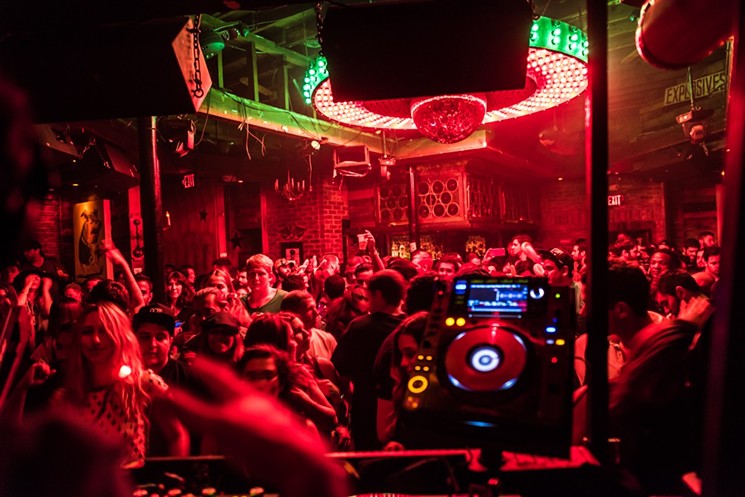
The dimly lit first floor of the Electric Pickle was rechristened as "Melinda's" last year in honor of Renuart's mother, the woman whose support birthed the club. In a booth near the entrance during the Pickle's tenth — and final — anniversary party on a recent night, Melinda looks absolutely timeless, with impeccably coiffed blond hair and a stylish all-white ensemble.
Melinda is Old Florida, the kind who still pronounces "Miami" my-AH-muh. She grew up a Coral Gables socialite, back when the word referred to a woman who had reached a certain stature thanks to her superb hostessing skills and ability to command a room. Renuart credits everything he learned about hosting a party to her, but when she's told this, she humbly refuses to accept the credit. "His grandmother was known for her parties," she says.
All night long, people approach Melinda to hug her and ask how she's doing. A painted portrait of her that Renuart "borrowed" from her home watches over the bar. When chef Matthew McKean drops off a bottle of El Tinieblo mezcal, she goes straight into hostess mode. "You have to try it," Melinda says to the table, insisting everyone drink it straight. It's easy to see where Renuart gets his panache for making people feel welcome.
The party soon moves upstairs to the Pickle's Bolero Room, the lounge where Detroit producer Moodymann is spinning. The club is so packed the A/C can barely keep up with the body heat.
"It's a little liquor-fueled love machine that went beyond what I could have hoped for."
tweet this
A few days earlier, as Renuart sat in a Wynwood café, his eyes had watered and his voice had cracked while he talked about the Pickle's impending closure. "It's a little liquor-fueled love machine that went beyond what I could have hoped for," he said. "It was done for the right reason. It wasn't dumb; it wasn't faked. It was blood, sweat, and tears, and it was specializing in what we truly believed. Maybe I fucked up a lot, and maybe I was too eager to get things done, but all my intentions were because I wanted the best place."
For Ceddia, the Pickle's end marks a shift in the city's attitude about nightlife: Once a source of bragging rights, nightclubs are now considered a nuisance. If it weren't for the nightclubs, Miami certainly wouldn't have the stature and global appeal it enjoys today. In the late '80s, the city attracted creatives from across the globe, and in the faded art deco buildings and downtown warehouses, they built an escape from the everyday. In the '90s, Miami shook off its retirement-community reputation and attracted supermodels and A-listers. The scene peaked in the early '00s, when anyone with a few thousand dollars and an idea could still find a crumbling building to turn into the next hottest club. Now the real-estate market has become a major obstacle to starting a venue.
"A lot of what you see in Miami and Miami Beach right now is vacant storefronts," Ceddia says. "It's a game where you don't want to see your tenants succeed; you want your tenants to pay a security deposit, pay a key fee. If your tenant goes out of business in a few months, you don't care, because you keep the deposit and you sell the key fee to the next person."
The Electric Pickle's looming closure has been bittersweet for Renuart, who admits he's looking forward to the end of this chapter of his life. He's itching to devote more time to other projects in Miami, including the December music festival Rakastella and his event series Where Are My Keys? He and Sino are also planning to spend a few months in her native Japan, where they'll stay with family and take part in a traditional Japanese wedding ceremony.
Ceddia, on the other hand, moved to Raleigh, North Carolina, four years ago to focus on raising his daughter. He says the thought of coming home smelling like booze and cigarettes no longer appealed to him.
"Everything has to come to an end. Ten years is a long time," Ceddia says.
As far as opening another club, Ceddia says that part of his life is over, while Renuart says he's simply looking forward to some much-needed rest.
"I may not be wealthy from the Pickle," Renuart says, "but I think we've created a brand that I know I'm proud of."

